Business Management: Autumn 2017 Academic Skills Portfolio (ACSK4001)
VerifiedAdded on 2020/05/04
|29
|6821
|257
Project
AI Summary
This Academic Skills Portfolio, completed by a Business Management student, encompasses a range of academic skills and reflective practices. It begins with self-evaluation checklists and a personal SWOT analysis, identifying strengths, weaknesses, opportunities, and threats. The portfolio then delves into structuring academic writing, including planning and outlining a report on Brexit's impact on businesses. Key sections cover quantitative data analysis, source evaluation, and synthesis techniques. The student demonstrates an understanding of referencing, in-text citations, and presentation skills. The portfolio culminates in reflective writing, a personal development plan, and a comprehensive academic writing piece analyzing the UK's exit from the European Union. The document showcases the student's growth in academic literacy and critical thinking throughout the course.
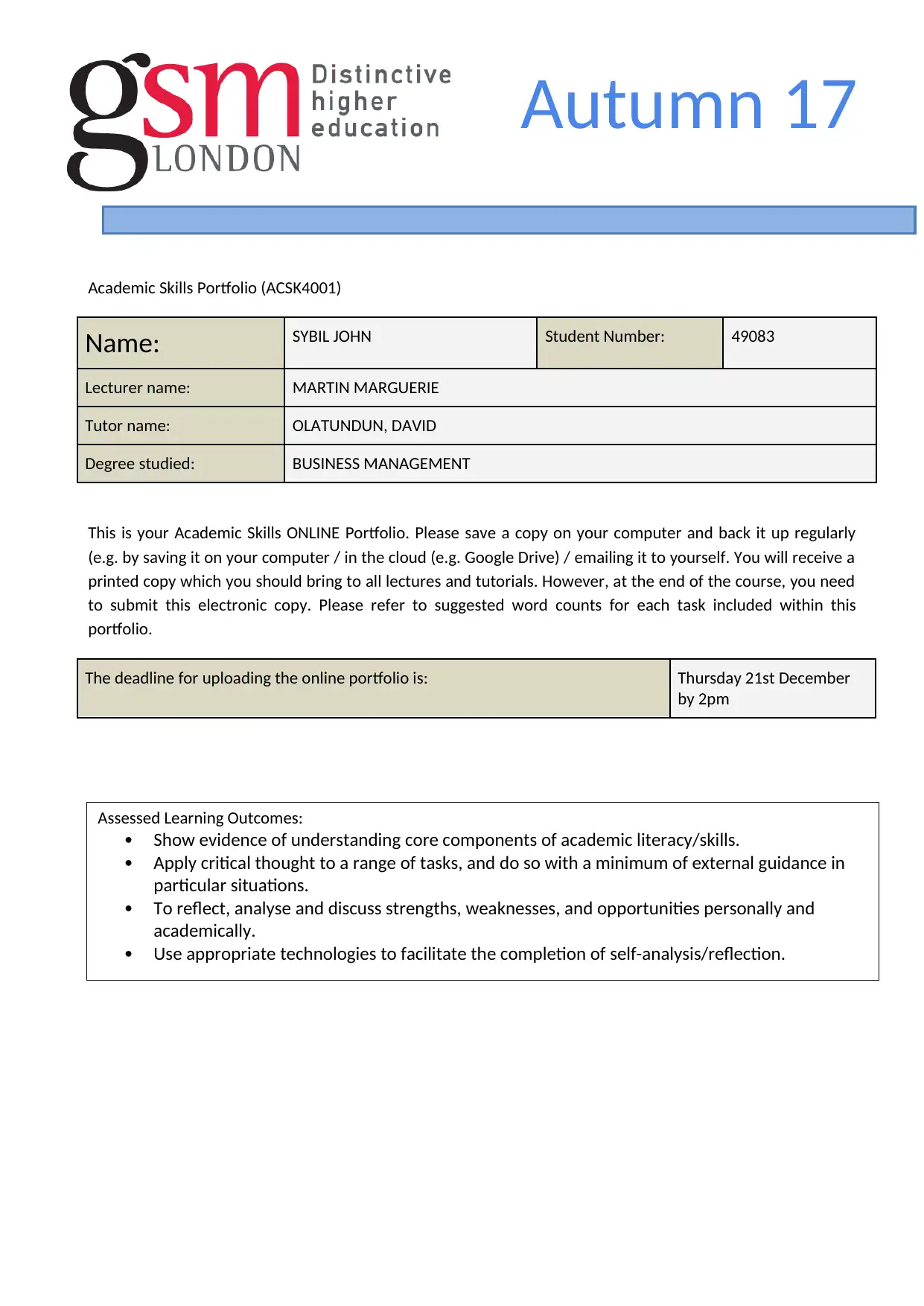
Autumn 17
Academic Skills Portfolio (ACSK4001)
Name: SYBIL JOHN Student Number: 49083
Lecturer name: MARTIN MARGUERIE
Tutor name: OLATUNDUN, DAVID
Degree studied: BUSINESS MANAGEMENT
This is your Academic Skills ONLINE Portfolio. Please save a copy on your computer and back it up regularly
(e.g. by saving it on your computer / in the cloud (e.g. Google Drive) / emailing it to yourself. You will receive a
printed copy which you should bring to all lectures and tutorials. However, at the end of the course, you need
to submit this electronic copy. Please refer to suggested word counts for each task included within this
portfolio.
The deadline for uploading the online portfolio is: Thursday 21st December
by 2pm
Assessed Learning Outcomes:
Show evidence of understanding core components of academic literacy/skills.
Apply critical thought to a range of tasks, and do so with a minimum of external guidance in
particular situations.
To reflect, analyse and discuss strengths, weaknesses, and opportunities personally and
academically.
Use appropriate technologies to facilitate the completion of self-analysis/reflection.
Academic Skills Portfolio (ACSK4001)
Name: SYBIL JOHN Student Number: 49083
Lecturer name: MARTIN MARGUERIE
Tutor name: OLATUNDUN, DAVID
Degree studied: BUSINESS MANAGEMENT
This is your Academic Skills ONLINE Portfolio. Please save a copy on your computer and back it up regularly
(e.g. by saving it on your computer / in the cloud (e.g. Google Drive) / emailing it to yourself. You will receive a
printed copy which you should bring to all lectures and tutorials. However, at the end of the course, you need
to submit this electronic copy. Please refer to suggested word counts for each task included within this
portfolio.
The deadline for uploading the online portfolio is: Thursday 21st December
by 2pm
Assessed Learning Outcomes:
Show evidence of understanding core components of academic literacy/skills.
Apply critical thought to a range of tasks, and do so with a minimum of external guidance in
particular situations.
To reflect, analyse and discuss strengths, weaknesses, and opportunities personally and
academically.
Use appropriate technologies to facilitate the completion of self-analysis/reflection.
Paraphrase This Document
Need a fresh take? Get an instant paraphrase of this document with our AI Paraphraser
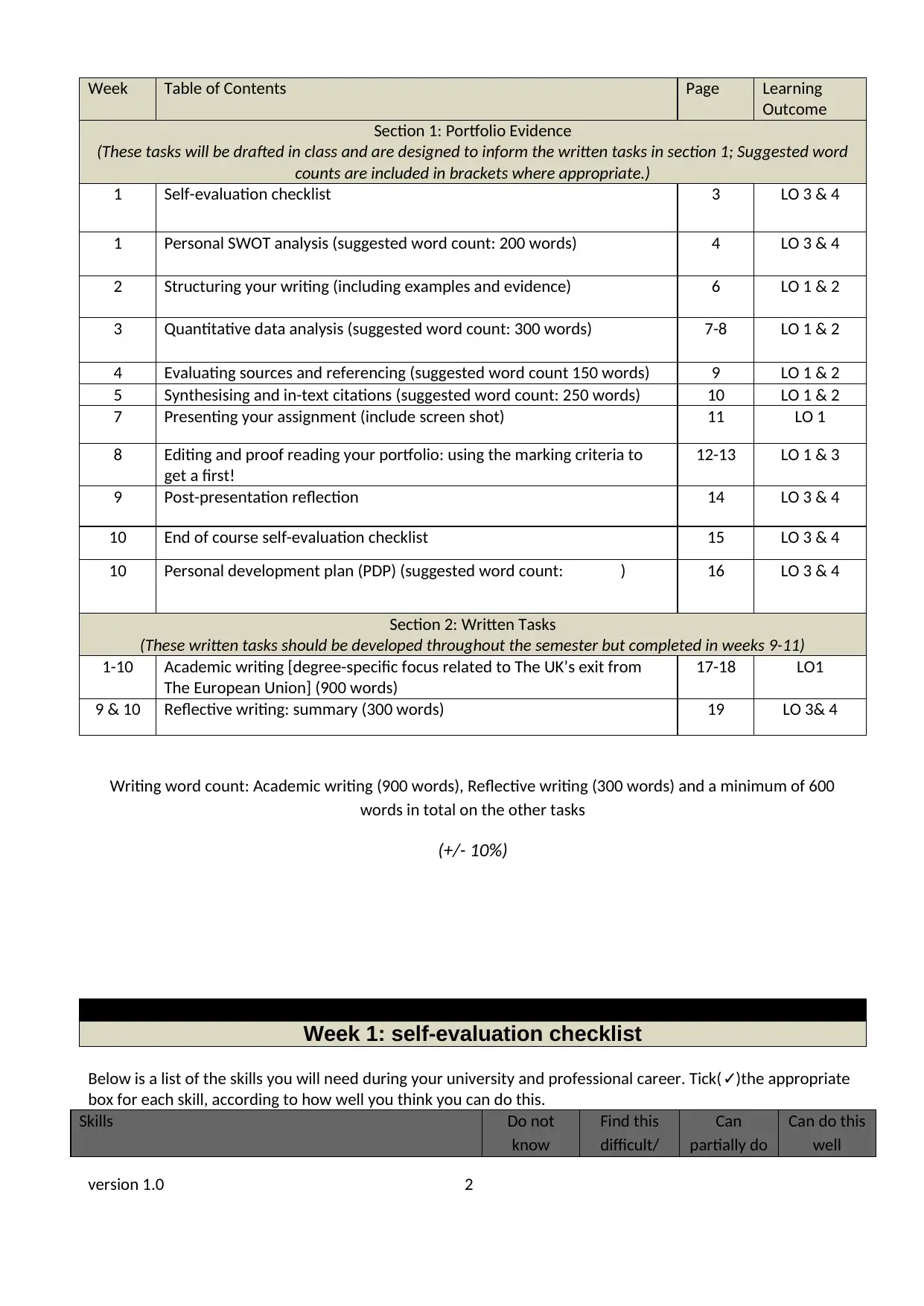
Week Table of Contents Page Learning
Outcome
Section 1: Portfolio Evidence
(These tasks will be drafted in class and are designed to inform the written tasks in section 1; Suggested word
counts are included in brackets where appropriate.)
1 Self-evaluation checklist 3 LO 3 & 4
1 Personal SWOT analysis (suggested word count: 200 words) 4 LO 3 & 4
2 Structuring your writing (including examples and evidence) 6 LO 1 & 2
3 Quantitative data analysis (suggested word count: 300 words) 7-8 LO 1 & 2
4 Evaluating sources and referencing (suggested word count 150 words) 9 LO 1 & 2
5 Synthesising and in-text citations (suggested word count: 250 words) 10 LO 1 & 2
7 Presenting your assignment (include screen shot) 11 LO 1
8 Editing and proof reading your portfolio: using the marking criteria to
get a first!
12-13 LO 1 & 3
9 Post-presentation reflection 14 LO 3 & 4
10 End of course self-evaluation checklist 15 LO 3 & 4
10 Personal development plan (PDP) (suggested word count: ) 16 LO 3 & 4
Section 2: Written Tasks
(These written tasks should be developed throughout the semester but completed in weeks 9-11)
1-10 Academic writing [degree-specific focus related to The UK’s exit from
The European Union] (900 words)
17-18 LO1
9 & 10 Reflective writing: summary (300 words) 19 LO 3& 4
Writing word count: Academic writing (900 words), Reflective writing (300 words) and a minimum of 600
words in total on the other tasks
(+/- 10%)
SECTION 1: PORTFOLIO EVIDENCE
Week 1: self-evaluation checklist
Below is a list of the skills you will need during your university and professional career. Tick( )the appropriate✓
box for each skill, according to how well you think you can do this.
Skills Do not
know
Find this
difficult/
Can
partially do
Can do this
well
version 1.0 2
Outcome
Section 1: Portfolio Evidence
(These tasks will be drafted in class and are designed to inform the written tasks in section 1; Suggested word
counts are included in brackets where appropriate.)
1 Self-evaluation checklist 3 LO 3 & 4
1 Personal SWOT analysis (suggested word count: 200 words) 4 LO 3 & 4
2 Structuring your writing (including examples and evidence) 6 LO 1 & 2
3 Quantitative data analysis (suggested word count: 300 words) 7-8 LO 1 & 2
4 Evaluating sources and referencing (suggested word count 150 words) 9 LO 1 & 2
5 Synthesising and in-text citations (suggested word count: 250 words) 10 LO 1 & 2
7 Presenting your assignment (include screen shot) 11 LO 1
8 Editing and proof reading your portfolio: using the marking criteria to
get a first!
12-13 LO 1 & 3
9 Post-presentation reflection 14 LO 3 & 4
10 End of course self-evaluation checklist 15 LO 3 & 4
10 Personal development plan (PDP) (suggested word count: ) 16 LO 3 & 4
Section 2: Written Tasks
(These written tasks should be developed throughout the semester but completed in weeks 9-11)
1-10 Academic writing [degree-specific focus related to The UK’s exit from
The European Union] (900 words)
17-18 LO1
9 & 10 Reflective writing: summary (300 words) 19 LO 3& 4
Writing word count: Academic writing (900 words), Reflective writing (300 words) and a minimum of 600
words in total on the other tasks
(+/- 10%)
SECTION 1: PORTFOLIO EVIDENCE
Week 1: self-evaluation checklist
Below is a list of the skills you will need during your university and professional career. Tick( )the appropriate✓
box for each skill, according to how well you think you can do this.
Skills Do not
know
Find this
difficult/
Can
partially do
Can do this
well
version 1.0 2
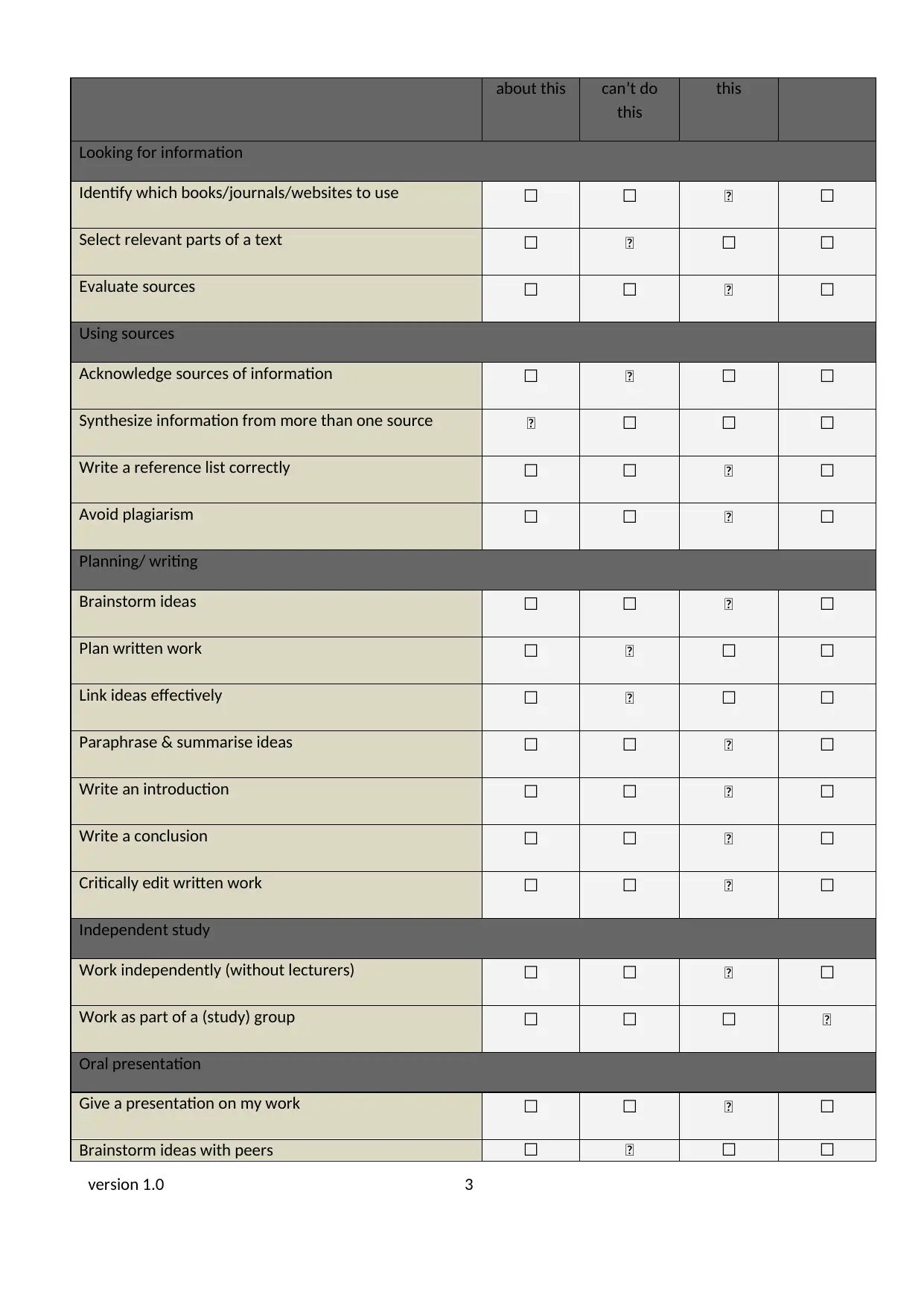
about this can’t do
this
this
Looking for information
Identify which books/journals/websites to use ☐ ☐ ☐
Select relevant parts of a text ☐ ☐ ☐
Evaluate sources ☐ ☐ ☐
Using sources
Acknowledge sources of information ☐ ☐ ☐
Synthesize information from more than one source ☐ ☐ ☐
Write a reference list correctly ☐ ☐ ☐
Avoid plagiarism ☐ ☐ ☐
Planning/ writing
Brainstorm ideas ☐ ☐ ☐
Plan written work ☐ ☐ ☐
Link ideas effectively ☐ ☐ ☐
Paraphrase & summarise ideas ☐ ☐ ☐
Write an introduction ☐ ☐ ☐
Write a conclusion ☐ ☐ ☐
Critically edit written work ☐ ☐ ☐
Independent study
Work independently (without lecturers) ☐ ☐ ☐
Work as part of a (study) group ☐ ☐ ☐
Oral presentation
Give a presentation on my work ☐ ☐ ☐
Brainstorm ideas with peers ☐ ☐ ☐
version 1.0 3
this
this
Looking for information
Identify which books/journals/websites to use ☐ ☐ ☐
Select relevant parts of a text ☐ ☐ ☐
Evaluate sources ☐ ☐ ☐
Using sources
Acknowledge sources of information ☐ ☐ ☐
Synthesize information from more than one source ☐ ☐ ☐
Write a reference list correctly ☐ ☐ ☐
Avoid plagiarism ☐ ☐ ☐
Planning/ writing
Brainstorm ideas ☐ ☐ ☐
Plan written work ☐ ☐ ☐
Link ideas effectively ☐ ☐ ☐
Paraphrase & summarise ideas ☐ ☐ ☐
Write an introduction ☐ ☐ ☐
Write a conclusion ☐ ☐ ☐
Critically edit written work ☐ ☐ ☐
Independent study
Work independently (without lecturers) ☐ ☐ ☐
Work as part of a (study) group ☐ ☐ ☐
Oral presentation
Give a presentation on my work ☐ ☐ ☐
Brainstorm ideas with peers ☐ ☐ ☐
version 1.0 3
⊘ This is a preview!⊘
Do you want full access?
Subscribe today to unlock all pages.

Trusted by 1+ million students worldwide
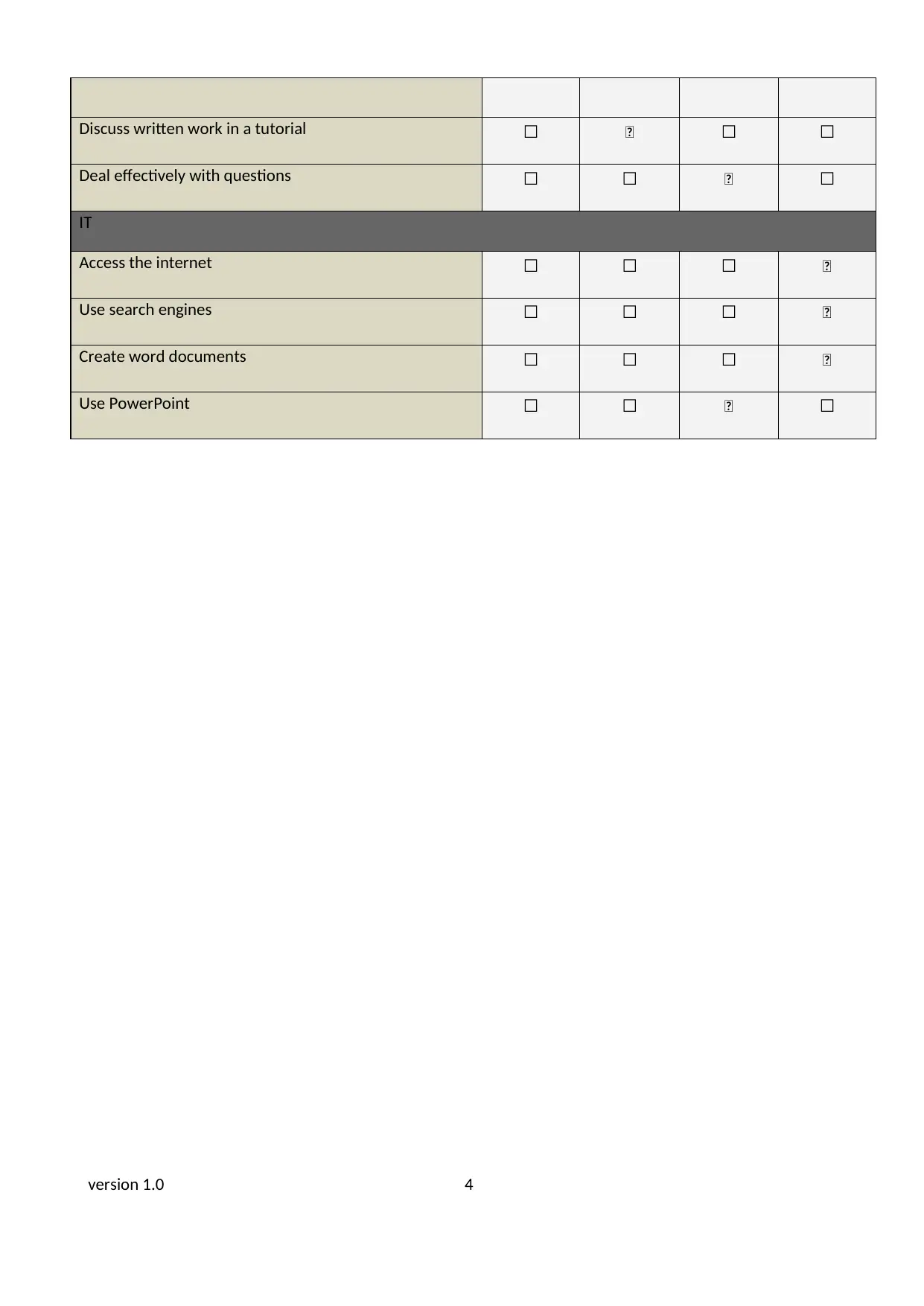
Discuss written work in a tutorial ☐ ☐ ☐
Deal effectively with questions ☐ ☐ ☐
IT
Access the internet ☐ ☐ ☐
Use search engines ☐ ☐ ☐
Create word documents ☐ ☐ ☐
Use PowerPoint ☐ ☐ ☐
version 1.0 4
Deal effectively with questions ☐ ☐ ☐
IT
Access the internet ☐ ☐ ☐
Use search engines ☐ ☐ ☐
Create word documents ☐ ☐ ☐
Use PowerPoint ☐ ☐ ☐
version 1.0 4
Paraphrase This Document
Need a fresh take? Get an instant paraphrase of this document with our AI Paraphraser
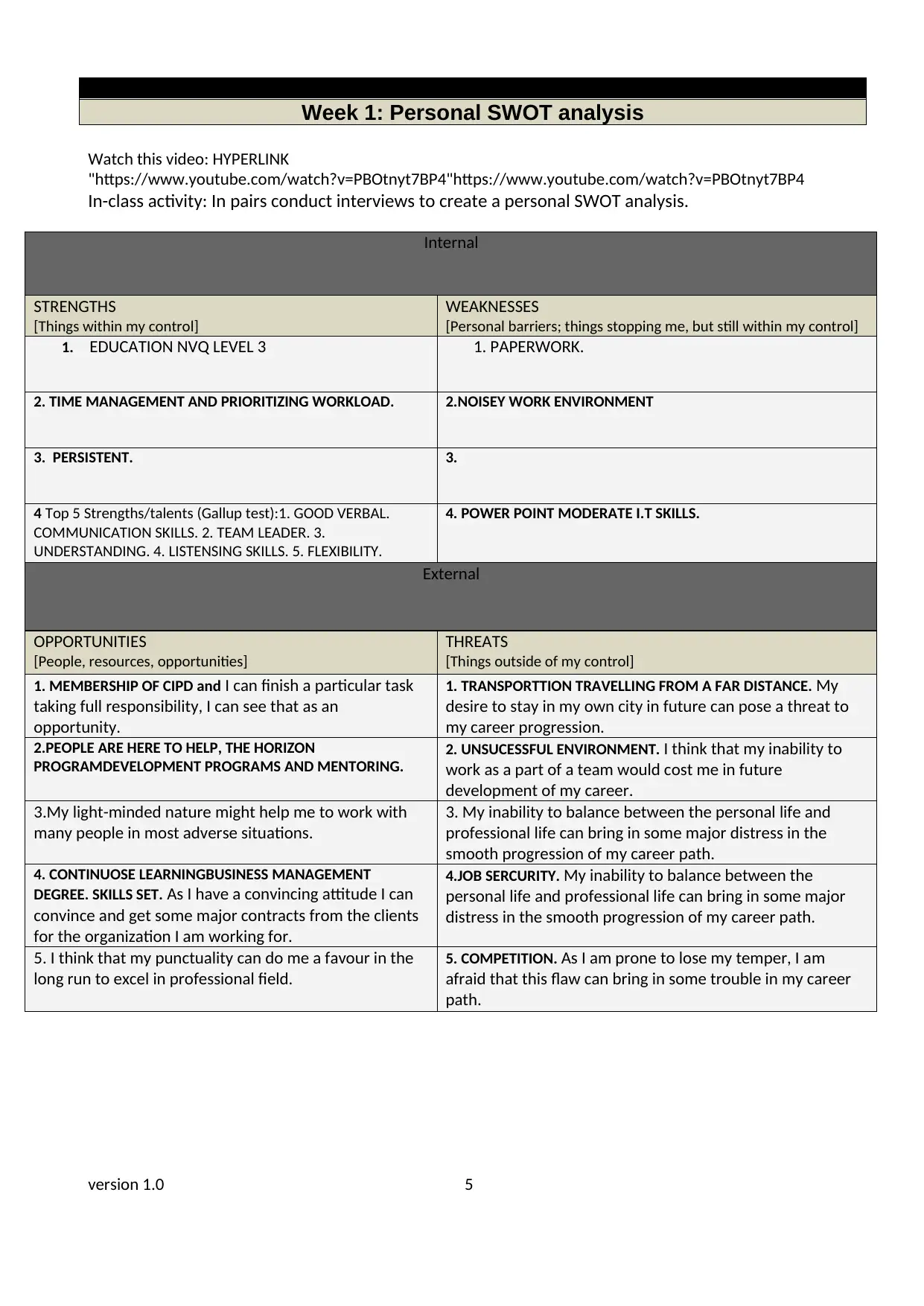
SECTION 1: PORTFOLIO EVIDENCE
Week 1: Personal SWOT analysis
Watch this video: HYPERLINK
"https://www.youtube.com/watch?v=PBOtnyt7BP4"https://www.youtube.com/watch?v=PBOtnyt7BP4
In-class activity: In pairs conduct interviews to create a personal SWOT analysis.
Internal
STRENGTHS
[Things within my control]
WEAKNESSES
[Personal barriers; things stopping me, but still within my control]
1. EDUCATION NVQ LEVEL 3 1. PAPERWORK.
2. TIME MANAGEMENT AND PRIORITIZING WORKLOAD. 2.NOISEY WORK ENVIRONMENT
3. PERSISTENT. 3.
4 Top 5 Strengths/talents (Gallup test):1. GOOD VERBAL.
COMMUNICATION SKILLS. 2. TEAM LEADER. 3.
UNDERSTANDING. 4. LISTENSING SKILLS. 5. FLEXIBILITY.
4. POWER POINT MODERATE I.T SKILLS.
External
OPPORTUNITIES
[People, resources, opportunities]
THREATS
[Things outside of my control]
1. MEMBERSHIP OF CIPD and I can finish a particular task
taking full responsibility, I can see that as an
opportunity.
1. TRANSPORTTION TRAVELLING FROM A FAR DISTANCE. My
desire to stay in my own city in future can pose a threat to
my career progression.
2.PEOPLE ARE HERE TO HELP, THE HORIZON
PROGRAMDEVELOPMENT PROGRAMS AND MENTORING.
2. UNSUCESSFUL ENVIRONMENT. I think that my inability to
work as a part of a team would cost me in future
development of my career.
3.My light-minded nature might help me to work with
many people in most adverse situations.
3. My inability to balance between the personal life and
professional life can bring in some major distress in the
smooth progression of my career path.
4. CONTINUOSE LEARNINGBUSINESS MANAGEMENT
DEGREE. SKILLS SET. As I have a convincing attitude I can
convince and get some major contracts from the clients
for the organization I am working for.
4.JOB SERCURITY. My inability to balance between the
personal life and professional life can bring in some major
distress in the smooth progression of my career path.
5. I think that my punctuality can do me a favour in the
long run to excel in professional field.
5. COMPETITION. As I am prone to lose my temper, I am
afraid that this flaw can bring in some trouble in my career
path.
version 1.0 5
Week 1: Personal SWOT analysis
Watch this video: HYPERLINK
"https://www.youtube.com/watch?v=PBOtnyt7BP4"https://www.youtube.com/watch?v=PBOtnyt7BP4
In-class activity: In pairs conduct interviews to create a personal SWOT analysis.
Internal
STRENGTHS
[Things within my control]
WEAKNESSES
[Personal barriers; things stopping me, but still within my control]
1. EDUCATION NVQ LEVEL 3 1. PAPERWORK.
2. TIME MANAGEMENT AND PRIORITIZING WORKLOAD. 2.NOISEY WORK ENVIRONMENT
3. PERSISTENT. 3.
4 Top 5 Strengths/talents (Gallup test):1. GOOD VERBAL.
COMMUNICATION SKILLS. 2. TEAM LEADER. 3.
UNDERSTANDING. 4. LISTENSING SKILLS. 5. FLEXIBILITY.
4. POWER POINT MODERATE I.T SKILLS.
External
OPPORTUNITIES
[People, resources, opportunities]
THREATS
[Things outside of my control]
1. MEMBERSHIP OF CIPD and I can finish a particular task
taking full responsibility, I can see that as an
opportunity.
1. TRANSPORTTION TRAVELLING FROM A FAR DISTANCE. My
desire to stay in my own city in future can pose a threat to
my career progression.
2.PEOPLE ARE HERE TO HELP, THE HORIZON
PROGRAMDEVELOPMENT PROGRAMS AND MENTORING.
2. UNSUCESSFUL ENVIRONMENT. I think that my inability to
work as a part of a team would cost me in future
development of my career.
3.My light-minded nature might help me to work with
many people in most adverse situations.
3. My inability to balance between the personal life and
professional life can bring in some major distress in the
smooth progression of my career path.
4. CONTINUOSE LEARNINGBUSINESS MANAGEMENT
DEGREE. SKILLS SET. As I have a convincing attitude I can
convince and get some major contracts from the clients
for the organization I am working for.
4.JOB SERCURITY. My inability to balance between the
personal life and professional life can bring in some major
distress in the smooth progression of my career path.
5. I think that my punctuality can do me a favour in the
long run to excel in professional field.
5. COMPETITION. As I am prone to lose my temper, I am
afraid that this flaw can bring in some trouble in my career
path.
version 1.0 5
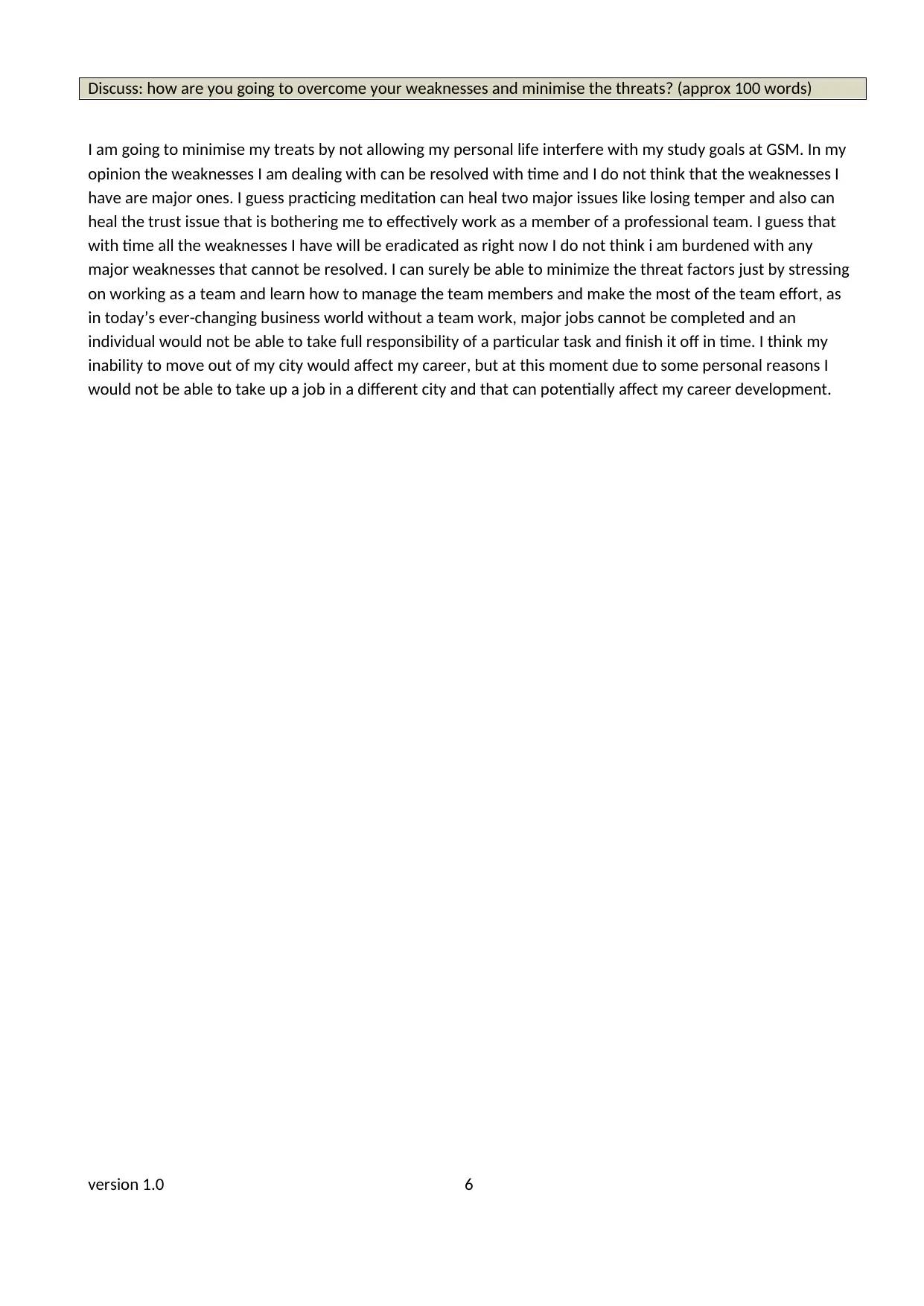
Discuss: how are you going to overcome your weaknesses and minimise the threats? (approx 100 words)
I am going to minimise my treats by not allowing my personal life interfere with my study goals at GSM. In my
opinion the weaknesses I am dealing with can be resolved with time and I do not think that the weaknesses I
have are major ones. I guess practicing meditation can heal two major issues like losing temper and also can
heal the trust issue that is bothering me to effectively work as a member of a professional team. I guess that
with time all the weaknesses I have will be eradicated as right now I do not think i am burdened with any
major weaknesses that cannot be resolved. I can surely be able to minimize the threat factors just by stressing
on working as a team and learn how to manage the team members and make the most of the team effort, as
in today’s ever-changing business world without a team work, major jobs cannot be completed and an
individual would not be able to take full responsibility of a particular task and finish it off in time. I think my
inability to move out of my city would affect my career, but at this moment due to some personal reasons I
would not be able to take up a job in a different city and that can potentially affect my career development.
version 1.0 6
I am going to minimise my treats by not allowing my personal life interfere with my study goals at GSM. In my
opinion the weaknesses I am dealing with can be resolved with time and I do not think that the weaknesses I
have are major ones. I guess practicing meditation can heal two major issues like losing temper and also can
heal the trust issue that is bothering me to effectively work as a member of a professional team. I guess that
with time all the weaknesses I have will be eradicated as right now I do not think i am burdened with any
major weaknesses that cannot be resolved. I can surely be able to minimize the threat factors just by stressing
on working as a team and learn how to manage the team members and make the most of the team effort, as
in today’s ever-changing business world without a team work, major jobs cannot be completed and an
individual would not be able to take full responsibility of a particular task and finish it off in time. I think my
inability to move out of my city would affect my career, but at this moment due to some personal reasons I
would not be able to take up a job in a different city and that can potentially affect my career development.
version 1.0 6
⊘ This is a preview!⊘
Do you want full access?
Subscribe today to unlock all pages.

Trusted by 1+ million students worldwide

version 1.0 7
Paraphrase This Document
Need a fresh take? Get an instant paraphrase of this document with our AI Paraphraser
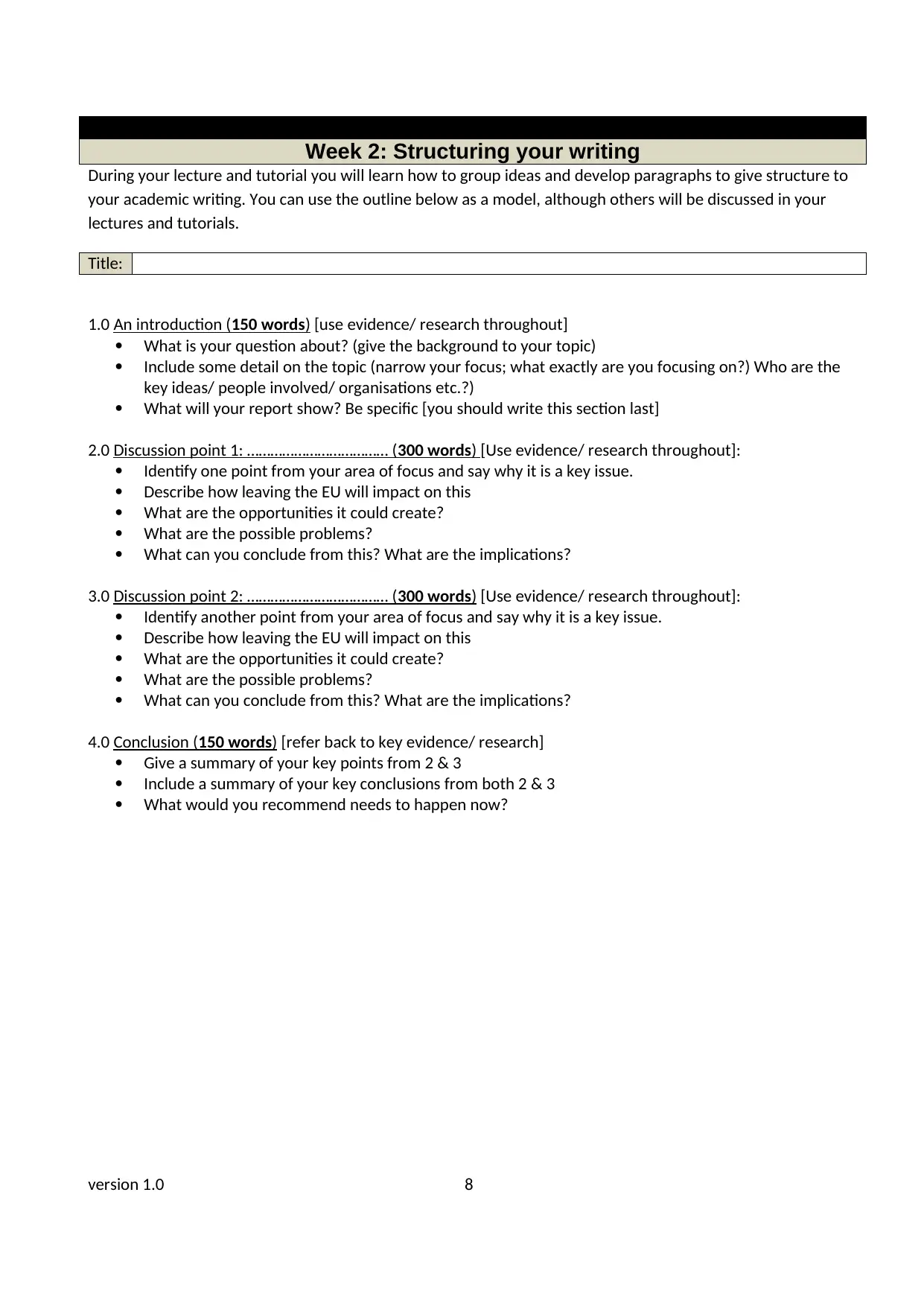
SECTION 1: PORTFOLIO EVIDENCE
Week 2: Structuring your writing
During your lecture and tutorial you will learn how to group ideas and develop paragraphs to give structure to
your academic writing. You can use the outline below as a model, although others will be discussed in your
lectures and tutorials.
Title:
1.0 An introduction (150 words) [use evidence/ research throughout]
What is your question about? (give the background to your topic)
Include some detail on the topic (narrow your focus; what exactly are you focusing on?) Who are the
key ideas/ people involved/ organisations etc.?)
What will your report show? Be specific [you should write this section last]
2.0 Discussion point 1: ……………………………… (300 words) [Use evidence/ research throughout]:
Identify one point from your area of focus and say why it is a key issue.
Describe how leaving the EU will impact on this
What are the opportunities it could create?
What are the possible problems?
What can you conclude from this? What are the implications?
3.0 Discussion point 2: ……………………………… (300 words) [Use evidence/ research throughout]:
Identify another point from your area of focus and say why it is a key issue.
Describe how leaving the EU will impact on this
What are the opportunities it could create?
What are the possible problems?
What can you conclude from this? What are the implications?
4.0 Conclusion (150 words) [refer back to key evidence/ research]
Give a summary of your key points from 2 & 3
Include a summary of your key conclusions from both 2 & 3
What would you recommend needs to happen now?
version 1.0 8
Week 2: Structuring your writing
During your lecture and tutorial you will learn how to group ideas and develop paragraphs to give structure to
your academic writing. You can use the outline below as a model, although others will be discussed in your
lectures and tutorials.
Title:
1.0 An introduction (150 words) [use evidence/ research throughout]
What is your question about? (give the background to your topic)
Include some detail on the topic (narrow your focus; what exactly are you focusing on?) Who are the
key ideas/ people involved/ organisations etc.?)
What will your report show? Be specific [you should write this section last]
2.0 Discussion point 1: ……………………………… (300 words) [Use evidence/ research throughout]:
Identify one point from your area of focus and say why it is a key issue.
Describe how leaving the EU will impact on this
What are the opportunities it could create?
What are the possible problems?
What can you conclude from this? What are the implications?
3.0 Discussion point 2: ……………………………… (300 words) [Use evidence/ research throughout]:
Identify another point from your area of focus and say why it is a key issue.
Describe how leaving the EU will impact on this
What are the opportunities it could create?
What are the possible problems?
What can you conclude from this? What are the implications?
4.0 Conclusion (150 words) [refer back to key evidence/ research]
Give a summary of your key points from 2 & 3
Include a summary of your key conclusions from both 2 & 3
What would you recommend needs to happen now?
version 1.0 8
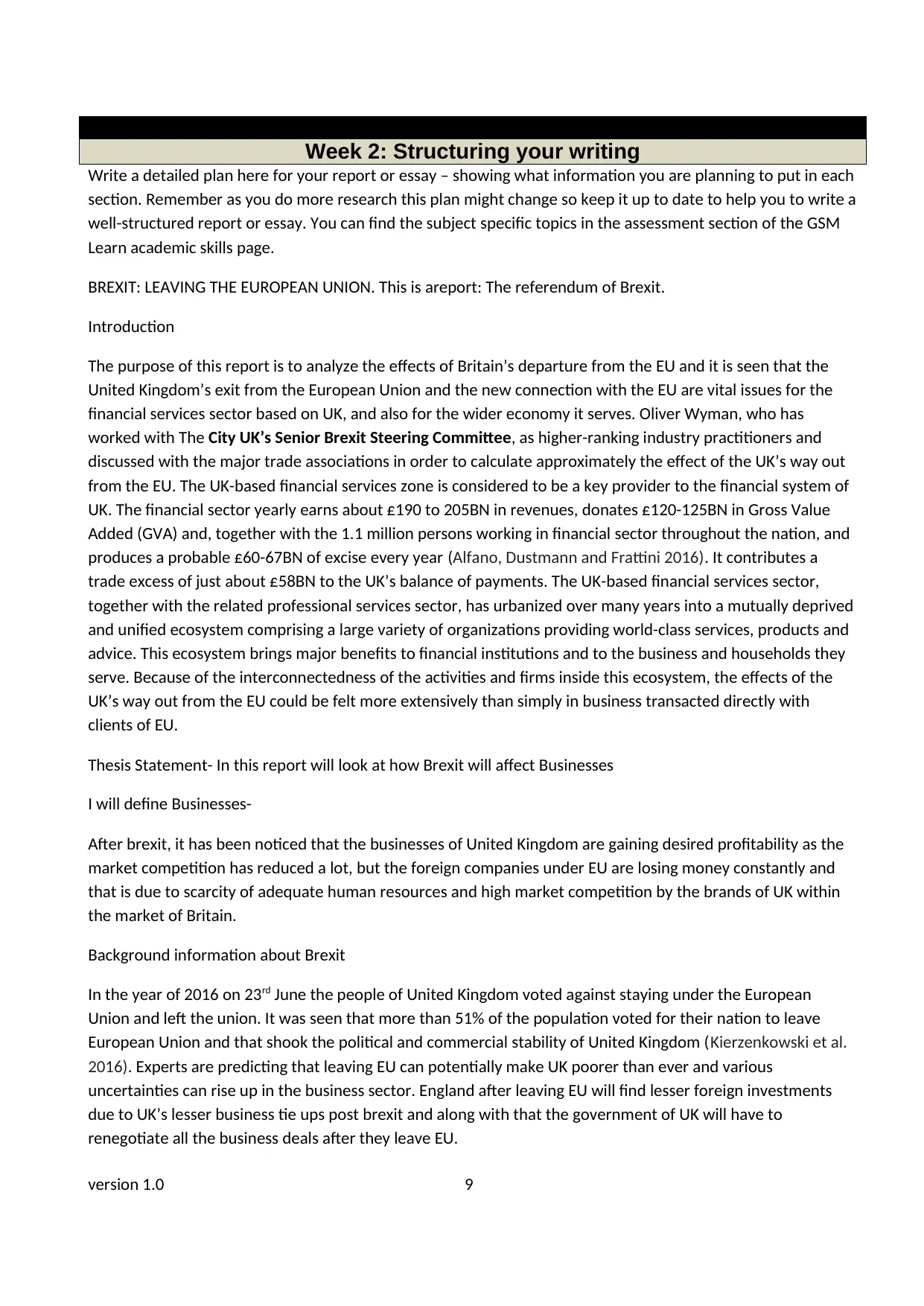
SECTION 1: PORTFOLIO EVIDENCE
Week 2: Structuring your writing
Write a detailed plan here for your report or essay – showing what information you are planning to put in each
section. Remember as you do more research this plan might change so keep it up to date to help you to write a
well-structured report or essay. You can find the subject specific topics in the assessment section of the GSM
Learn academic skills page.
BREXIT: LEAVING THE EUROPEAN UNION. This is areport: The referendum of Brexit.
Introduction
The purpose of this report is to analyze the effects of Britain’s departure from the EU and it is seen that the
United Kingdom’s exit from the European Union and the new connection with the EU are vital issues for the
financial services sector based on UK, and also for the wider economy it serves. Oliver Wyman, who has
worked with The City UK’s Senior Brexit Steering Committee, as higher-ranking industry practitioners and
discussed with the major trade associations in order to calculate approximately the effect of the UK’s way out
from the EU. The UK-based financial services zone is considered to be a key provider to the financial system of
UK. The financial sector yearly earns about £190 to 205BN in revenues, donates £120-125BN in Gross Value
Added (GVA) and, together with the 1.1 million persons working in financial sector throughout the nation, and
produces a probable £60-67BN of excise every year (Alfano, Dustmann and Frattini 2016). It contributes a
trade excess of just about £58BN to the UK’s balance of payments. The UK-based financial services sector,
together with the related professional services sector, has urbanized over many years into a mutually deprived
and unified ecosystem comprising a large variety of organizations providing world-class services, products and
advice. This ecosystem brings major benefits to financial institutions and to the business and households they
serve. Because of the interconnectedness of the activities and firms inside this ecosystem, the effects of the
UK’s way out from the EU could be felt more extensively than simply in business transacted directly with
clients of EU.
Thesis Statement- In this report will look at how Brexit will affect Businesses
I will define Businesses-
After brexit, it has been noticed that the businesses of United Kingdom are gaining desired profitability as the
market competition has reduced a lot, but the foreign companies under EU are losing money constantly and
that is due to scarcity of adequate human resources and high market competition by the brands of UK within
the market of Britain.
Background information about Brexit
In the year of 2016 on 23rd June the people of United Kingdom voted against staying under the European
Union and left the union. It was seen that more than 51% of the population voted for their nation to leave
European Union and that shook the political and commercial stability of United Kingdom (Kierzenkowski et al.
2016). Experts are predicting that leaving EU can potentially make UK poorer than ever and various
uncertainties can rise up in the business sector. England after leaving EU will find lesser foreign investments
due to UK’s lesser business tie ups post brexit and along with that the government of UK will have to
renegotiate all the business deals after they leave EU.
version 1.0 9
Week 2: Structuring your writing
Write a detailed plan here for your report or essay – showing what information you are planning to put in each
section. Remember as you do more research this plan might change so keep it up to date to help you to write a
well-structured report or essay. You can find the subject specific topics in the assessment section of the GSM
Learn academic skills page.
BREXIT: LEAVING THE EUROPEAN UNION. This is areport: The referendum of Brexit.
Introduction
The purpose of this report is to analyze the effects of Britain’s departure from the EU and it is seen that the
United Kingdom’s exit from the European Union and the new connection with the EU are vital issues for the
financial services sector based on UK, and also for the wider economy it serves. Oliver Wyman, who has
worked with The City UK’s Senior Brexit Steering Committee, as higher-ranking industry practitioners and
discussed with the major trade associations in order to calculate approximately the effect of the UK’s way out
from the EU. The UK-based financial services zone is considered to be a key provider to the financial system of
UK. The financial sector yearly earns about £190 to 205BN in revenues, donates £120-125BN in Gross Value
Added (GVA) and, together with the 1.1 million persons working in financial sector throughout the nation, and
produces a probable £60-67BN of excise every year (Alfano, Dustmann and Frattini 2016). It contributes a
trade excess of just about £58BN to the UK’s balance of payments. The UK-based financial services sector,
together with the related professional services sector, has urbanized over many years into a mutually deprived
and unified ecosystem comprising a large variety of organizations providing world-class services, products and
advice. This ecosystem brings major benefits to financial institutions and to the business and households they
serve. Because of the interconnectedness of the activities and firms inside this ecosystem, the effects of the
UK’s way out from the EU could be felt more extensively than simply in business transacted directly with
clients of EU.
Thesis Statement- In this report will look at how Brexit will affect Businesses
I will define Businesses-
After brexit, it has been noticed that the businesses of United Kingdom are gaining desired profitability as the
market competition has reduced a lot, but the foreign companies under EU are losing money constantly and
that is due to scarcity of adequate human resources and high market competition by the brands of UK within
the market of Britain.
Background information about Brexit
In the year of 2016 on 23rd June the people of United Kingdom voted against staying under the European
Union and left the union. It was seen that more than 51% of the population voted for their nation to leave
European Union and that shook the political and commercial stability of United Kingdom (Kierzenkowski et al.
2016). Experts are predicting that leaving EU can potentially make UK poorer than ever and various
uncertainties can rise up in the business sector. England after leaving EU will find lesser foreign investments
due to UK’s lesser business tie ups post brexit and along with that the government of UK will have to
renegotiate all the business deals after they leave EU.
version 1.0 9
⊘ This is a preview!⊘
Do you want full access?
Subscribe today to unlock all pages.

Trusted by 1+ million students worldwide
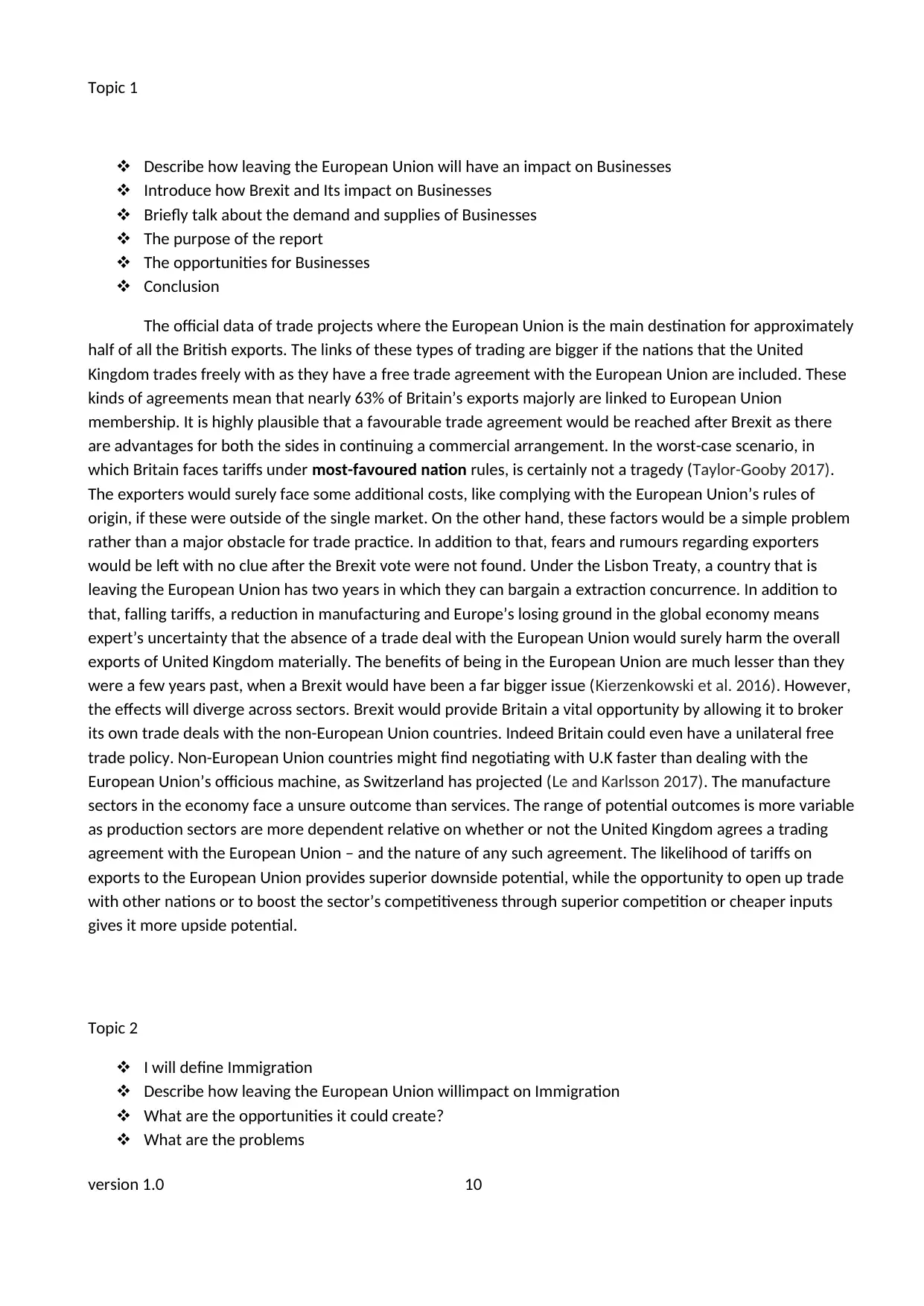
Topic 1
Describe how leaving the European Union will have an impact on Businesses
Introduce how Brexit and Its impact on Businesses
Briefly talk about the demand and supplies of Businesses
The purpose of the report
The opportunities for Businesses
Conclusion
The official data of trade projects where the European Union is the main destination for approximately
half of all the British exports. The links of these types of trading are bigger if the nations that the United
Kingdom trades freely with as they have a free trade agreement with the European Union are included. These
kinds of agreements mean that nearly 63% of Britain’s exports majorly are linked to European Union
membership. It is highly plausible that a favourable trade agreement would be reached after Brexit as there
are advantages for both the sides in continuing a commercial arrangement. In the worst-case scenario, in
which Britain faces tariffs under most-favoured nation rules, is certainly not a tragedy (Taylor-Gooby 2017).
The exporters would surely face some additional costs, like complying with the European Union’s rules of
origin, if these were outside of the single market. On the other hand, these factors would be a simple problem
rather than a major obstacle for trade practice. In addition to that, fears and rumours regarding exporters
would be left with no clue after the Brexit vote were not found. Under the Lisbon Treaty, a country that is
leaving the European Union has two years in which they can bargain a extraction concurrence. In addition to
that, falling tariffs, a reduction in manufacturing and Europe’s losing ground in the global economy means
expert’s uncertainty that the absence of a trade deal with the European Union would surely harm the overall
exports of United Kingdom materially. The benefits of being in the European Union are much lesser than they
were a few years past, when a Brexit would have been a far bigger issue (Kierzenkowski et al. 2016). However,
the effects will diverge across sectors. Brexit would provide Britain a vital opportunity by allowing it to broker
its own trade deals with the non-European Union countries. Indeed Britain could even have a unilateral free
trade policy. Non-European Union countries might find negotiating with U.K faster than dealing with the
European Union’s officious machine, as Switzerland has projected (Le and Karlsson 2017). The manufacture
sectors in the economy face a unsure outcome than services. The range of potential outcomes is more variable
as production sectors are more dependent relative on whether or not the United Kingdom agrees a trading
agreement with the European Union – and the nature of any such agreement. The likelihood of tariffs on
exports to the European Union provides superior downside potential, while the opportunity to open up trade
with other nations or to boost the sector’s competitiveness through superior competition or cheaper inputs
gives it more upside potential.
Topic 2
I will define Immigration
Describe how leaving the European Union willimpact on Immigration
What are the opportunities it could create?
What are the problems
version 1.0 10
Describe how leaving the European Union will have an impact on Businesses
Introduce how Brexit and Its impact on Businesses
Briefly talk about the demand and supplies of Businesses
The purpose of the report
The opportunities for Businesses
Conclusion
The official data of trade projects where the European Union is the main destination for approximately
half of all the British exports. The links of these types of trading are bigger if the nations that the United
Kingdom trades freely with as they have a free trade agreement with the European Union are included. These
kinds of agreements mean that nearly 63% of Britain’s exports majorly are linked to European Union
membership. It is highly plausible that a favourable trade agreement would be reached after Brexit as there
are advantages for both the sides in continuing a commercial arrangement. In the worst-case scenario, in
which Britain faces tariffs under most-favoured nation rules, is certainly not a tragedy (Taylor-Gooby 2017).
The exporters would surely face some additional costs, like complying with the European Union’s rules of
origin, if these were outside of the single market. On the other hand, these factors would be a simple problem
rather than a major obstacle for trade practice. In addition to that, fears and rumours regarding exporters
would be left with no clue after the Brexit vote were not found. Under the Lisbon Treaty, a country that is
leaving the European Union has two years in which they can bargain a extraction concurrence. In addition to
that, falling tariffs, a reduction in manufacturing and Europe’s losing ground in the global economy means
expert’s uncertainty that the absence of a trade deal with the European Union would surely harm the overall
exports of United Kingdom materially. The benefits of being in the European Union are much lesser than they
were a few years past, when a Brexit would have been a far bigger issue (Kierzenkowski et al. 2016). However,
the effects will diverge across sectors. Brexit would provide Britain a vital opportunity by allowing it to broker
its own trade deals with the non-European Union countries. Indeed Britain could even have a unilateral free
trade policy. Non-European Union countries might find negotiating with U.K faster than dealing with the
European Union’s officious machine, as Switzerland has projected (Le and Karlsson 2017). The manufacture
sectors in the economy face a unsure outcome than services. The range of potential outcomes is more variable
as production sectors are more dependent relative on whether or not the United Kingdom agrees a trading
agreement with the European Union – and the nature of any such agreement. The likelihood of tariffs on
exports to the European Union provides superior downside potential, while the opportunity to open up trade
with other nations or to boost the sector’s competitiveness through superior competition or cheaper inputs
gives it more upside potential.
Topic 2
I will define Immigration
Describe how leaving the European Union willimpact on Immigration
What are the opportunities it could create?
What are the problems
version 1.0 10
Paraphrase This Document
Need a fresh take? Get an instant paraphrase of this document with our AI Paraphraser
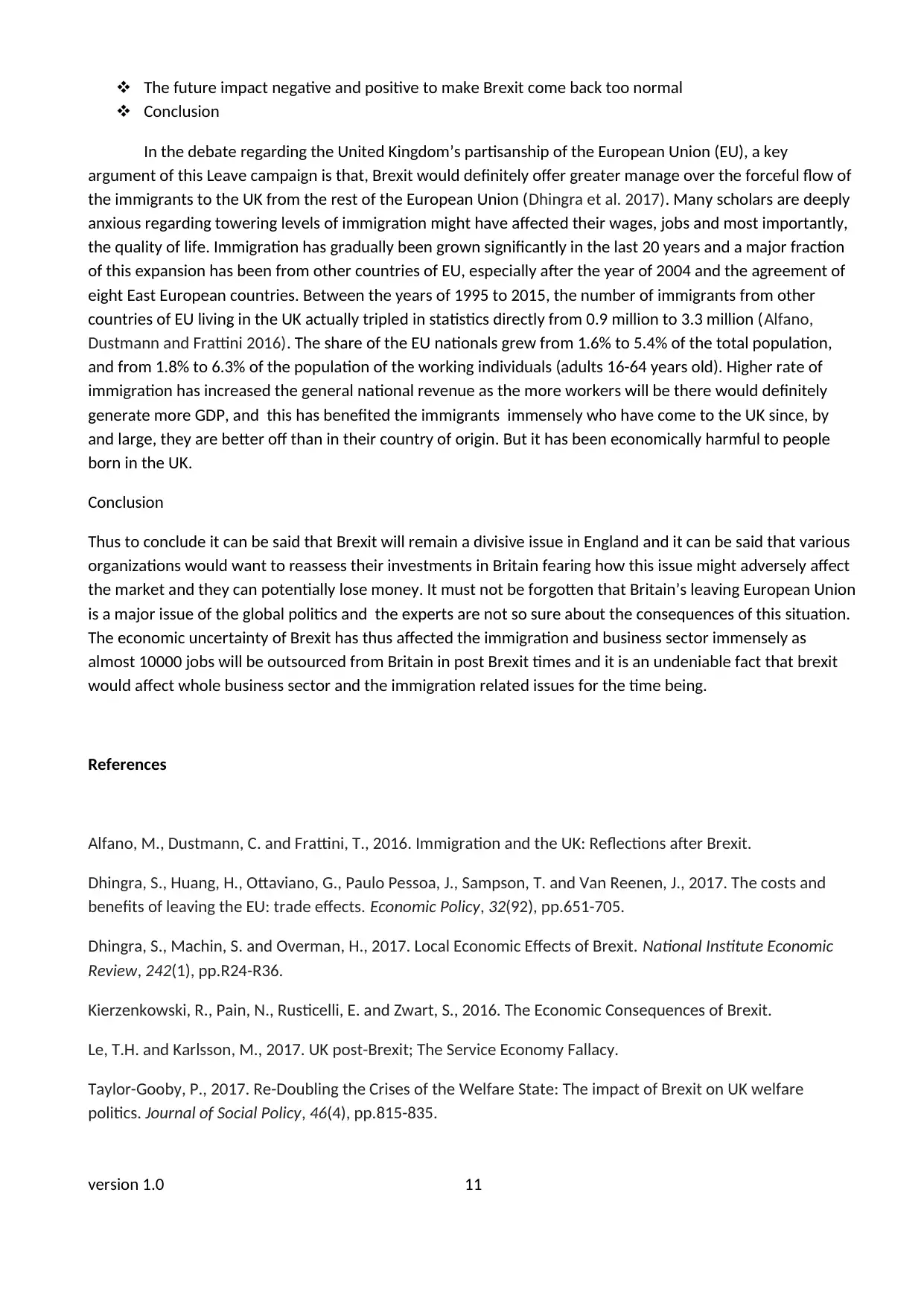
The future impact negative and positive to make Brexit come back too normal
Conclusion
In the debate regarding the United Kingdom’s partisanship of the European Union (EU), a key
argument of this Leave campaign is that, Brexit would definitely offer greater manage over the forceful flow of
the immigrants to the UK from the rest of the European Union (Dhingra et al. 2017). Many scholars are deeply
anxious regarding towering levels of immigration might have affected their wages, jobs and most importantly,
the quality of life. Immigration has gradually been grown significantly in the last 20 years and a major fraction
of this expansion has been from other countries of EU, especially after the year of 2004 and the agreement of
eight East European countries. Between the years of 1995 to 2015, the number of immigrants from other
countries of EU living in the UK actually tripled in statistics directly from 0.9 million to 3.3 million (Alfano,
Dustmann and Frattini 2016). The share of the EU nationals grew from 1.6% to 5.4% of the total population,
and from 1.8% to 6.3% of the population of the working individuals (adults 16-64 years old). Higher rate of
immigration has increased the general national revenue as the more workers will be there would definitely
generate more GDP, and this has benefited the immigrants immensely who have come to the UK since, by
and large, they are better off than in their country of origin. But it has been economically harmful to people
born in the UK.
Conclusion
Thus to conclude it can be said that Brexit will remain a divisive issue in England and it can be said that various
organizations would want to reassess their investments in Britain fearing how this issue might adversely affect
the market and they can potentially lose money. It must not be forgotten that Britain’s leaving European Union
is a major issue of the global politics and the experts are not so sure about the consequences of this situation.
The economic uncertainty of Brexit has thus affected the immigration and business sector immensely as
almost 10000 jobs will be outsourced from Britain in post Brexit times and it is an undeniable fact that brexit
would affect whole business sector and the immigration related issues for the time being.
References
Alfano, M., Dustmann, C. and Frattini, T., 2016. Immigration and the UK: Reflections after Brexit.
Dhingra, S., Huang, H., Ottaviano, G., Paulo Pessoa, J., Sampson, T. and Van Reenen, J., 2017. The costs and
benefits of leaving the EU: trade effects. Economic Policy, 32(92), pp.651-705.
Dhingra, S., Machin, S. and Overman, H., 2017. Local Economic Effects of Brexit. National Institute Economic
Review, 242(1), pp.R24-R36.
Kierzenkowski, R., Pain, N., Rusticelli, E. and Zwart, S., 2016. The Economic Consequences of Brexit.
Le, T.H. and Karlsson, M., 2017. UK post-Brexit; The Service Economy Fallacy.
Taylor-Gooby, P., 2017. Re-Doubling the Crises of the Welfare State: The impact of Brexit on UK welfare
politics. Journal of Social Policy, 46(4), pp.815-835.
version 1.0 11
Conclusion
In the debate regarding the United Kingdom’s partisanship of the European Union (EU), a key
argument of this Leave campaign is that, Brexit would definitely offer greater manage over the forceful flow of
the immigrants to the UK from the rest of the European Union (Dhingra et al. 2017). Many scholars are deeply
anxious regarding towering levels of immigration might have affected their wages, jobs and most importantly,
the quality of life. Immigration has gradually been grown significantly in the last 20 years and a major fraction
of this expansion has been from other countries of EU, especially after the year of 2004 and the agreement of
eight East European countries. Between the years of 1995 to 2015, the number of immigrants from other
countries of EU living in the UK actually tripled in statistics directly from 0.9 million to 3.3 million (Alfano,
Dustmann and Frattini 2016). The share of the EU nationals grew from 1.6% to 5.4% of the total population,
and from 1.8% to 6.3% of the population of the working individuals (adults 16-64 years old). Higher rate of
immigration has increased the general national revenue as the more workers will be there would definitely
generate more GDP, and this has benefited the immigrants immensely who have come to the UK since, by
and large, they are better off than in their country of origin. But it has been economically harmful to people
born in the UK.
Conclusion
Thus to conclude it can be said that Brexit will remain a divisive issue in England and it can be said that various
organizations would want to reassess their investments in Britain fearing how this issue might adversely affect
the market and they can potentially lose money. It must not be forgotten that Britain’s leaving European Union
is a major issue of the global politics and the experts are not so sure about the consequences of this situation.
The economic uncertainty of Brexit has thus affected the immigration and business sector immensely as
almost 10000 jobs will be outsourced from Britain in post Brexit times and it is an undeniable fact that brexit
would affect whole business sector and the immigration related issues for the time being.
References
Alfano, M., Dustmann, C. and Frattini, T., 2016. Immigration and the UK: Reflections after Brexit.
Dhingra, S., Huang, H., Ottaviano, G., Paulo Pessoa, J., Sampson, T. and Van Reenen, J., 2017. The costs and
benefits of leaving the EU: trade effects. Economic Policy, 32(92), pp.651-705.
Dhingra, S., Machin, S. and Overman, H., 2017. Local Economic Effects of Brexit. National Institute Economic
Review, 242(1), pp.R24-R36.
Kierzenkowski, R., Pain, N., Rusticelli, E. and Zwart, S., 2016. The Economic Consequences of Brexit.
Le, T.H. and Karlsson, M., 2017. UK post-Brexit; The Service Economy Fallacy.
Taylor-Gooby, P., 2017. Re-Doubling the Crises of the Welfare State: The impact of Brexit on UK welfare
politics. Journal of Social Policy, 46(4), pp.815-835.
version 1.0 11
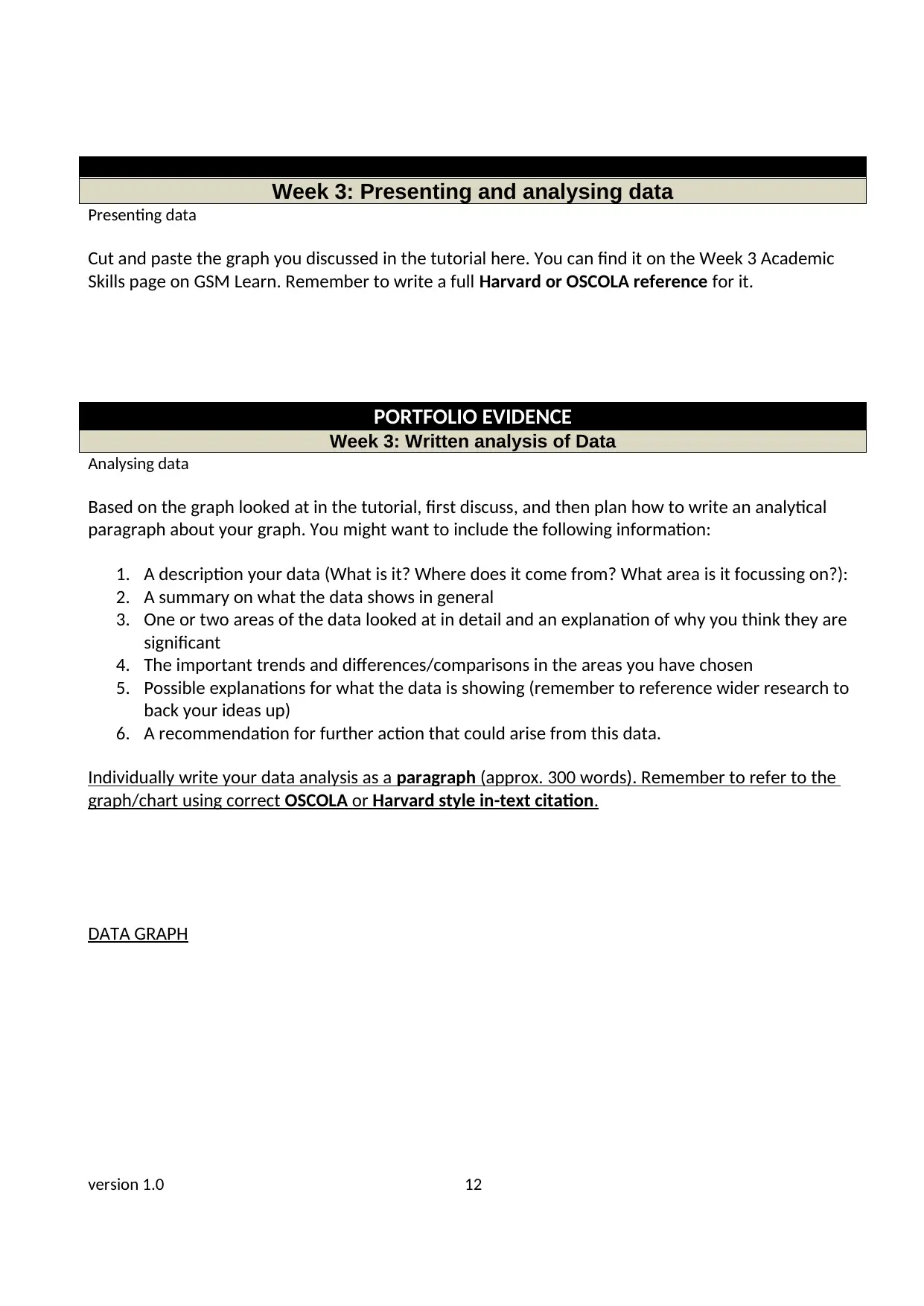
SECTION 1: PORTFOLIO EVIDENCE
Week 3: Presenting and analysing data
Presenting data
Cut and paste the graph you discussed in the tutorial here. You can find it on the Week 3 Academic
Skills page on GSM Learn. Remember to write a full Harvard or OSCOLA reference for it.
PORTFOLIO EVIDENCE
Week 3: Written analysis of Data
Analysing data
Based on the graph looked at in the tutorial, first discuss, and then plan how to write an analytical
paragraph about your graph. You might want to include the following information:
1. A description your data (What is it? Where does it come from? What area is it focussing on?):
2. A summary on what the data shows in general
3. One or two areas of the data looked at in detail and an explanation of why you think they are
significant
4. The important trends and differences/comparisons in the areas you have chosen
5. Possible explanations for what the data is showing (remember to reference wider research to
back your ideas up)
6. A recommendation for further action that could arise from this data.
Individually write your data analysis as a paragraph (approx. 300 words). Remember to refer to the
graph/chart using correct OSCOLA or Harvard style in-text citation.
DATA GRAPH
version 1.0 12
Week 3: Presenting and analysing data
Presenting data
Cut and paste the graph you discussed in the tutorial here. You can find it on the Week 3 Academic
Skills page on GSM Learn. Remember to write a full Harvard or OSCOLA reference for it.
PORTFOLIO EVIDENCE
Week 3: Written analysis of Data
Analysing data
Based on the graph looked at in the tutorial, first discuss, and then plan how to write an analytical
paragraph about your graph. You might want to include the following information:
1. A description your data (What is it? Where does it come from? What area is it focussing on?):
2. A summary on what the data shows in general
3. One or two areas of the data looked at in detail and an explanation of why you think they are
significant
4. The important trends and differences/comparisons in the areas you have chosen
5. Possible explanations for what the data is showing (remember to reference wider research to
back your ideas up)
6. A recommendation for further action that could arise from this data.
Individually write your data analysis as a paragraph (approx. 300 words). Remember to refer to the
graph/chart using correct OSCOLA or Harvard style in-text citation.
DATA GRAPH
version 1.0 12
⊘ This is a preview!⊘
Do you want full access?
Subscribe today to unlock all pages.

Trusted by 1+ million students worldwide
1 out of 29
Related Documents
Your All-in-One AI-Powered Toolkit for Academic Success.
+13062052269
info@desklib.com
Available 24*7 on WhatsApp / Email
![[object Object]](/_next/static/media/star-bottom.7253800d.svg)
Unlock your academic potential
Copyright © 2020–2026 A2Z Services. All Rights Reserved. Developed and managed by ZUCOL.




